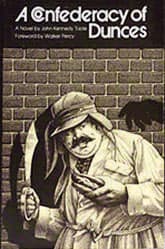A Confederacy of Dunces
Critique • Quotes
 First edition
First editionFirst publication
1988
Literature form
Novel
Genres
Literary, satire
Writing language
English
Author's country
United States
Length
Approx. 140,000 words
An intellectual Falstaff
The story behind the discovery of this novel has become such an inspiring and sad modern legend that I want to be able to say the novel itself is brilliant.
Either that, or be able to call it a disaster—to spite misguided critics and its legion of devoted fans.
But I can't do either. A Confederacy of Dunces is diverting and intermittently humorous in an odd and intellectual way. Even pathetic in a twisted way. But it never excites me either mentally or viscerally. I certainly don't find it uproariously funny or deeply touching, as others report.
This is not to say A Confederacy of Dunces won't endure as a classic novel in the category of grotesque realism. Just that it's not the kind of writing that excites me. I do, though, recognize the tremendous skill the previously unheralded John Kennedy Toole displays in maintaining the bizarre characters without ever losing control or credibility and in perfectly meshing them in a helter-skelter plot that nonetheless coheres and comes together beautifully at the end.
The title is a quote from Jonathan Swift: "When a true genius appears in the world, you may know him by this sign, that the dunces are all in confederacy against him."
The title would be approved by the unlikely protagonist Ignatius J. Reilly. The grossly overweight, lazy and ridiculous Reilly considers himself a misunderstood genius who is always about to burst forth onto the world to put it right, if only all the small-minded fools would follow his bizarre instructions. Much of the novel, set in the early 1960s, follows the disastrous attempts of this outcast from the decaying upper class of New Orleans to get a job in the city's colourful French Quarter.
Real life novelist Walker Percy in the foreword describes Reilly as a "slob extraordinaire, a mad Oliver Hardy, a fat Don Quixote, a perverse Thomas Aquinas rolled into one".
I would add Falstaff to the ingredients, for Reilly's idealism is more than tinged with transparent self-deception and self-pity.
The other characters are equally larger than life, if not as fully nuanced. Most memorable is Reilly's mother, clinging and cloying, and annoyingly ignorant by turns. Also Jones, the black, sabotaging floor sweeper at the Night of Joy nightclub where Ignatius wreaks his climactic havoc.
All good fun, and well done. Just doesn't move me particularly.
— Eric
Critique • Quotes

